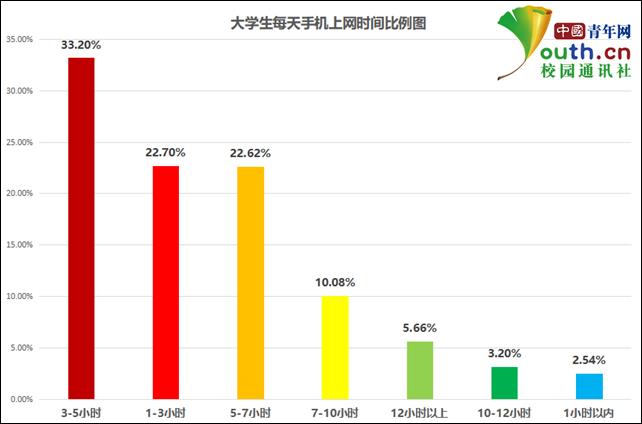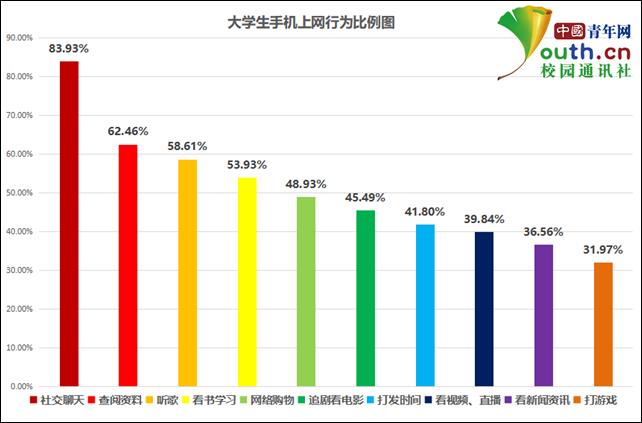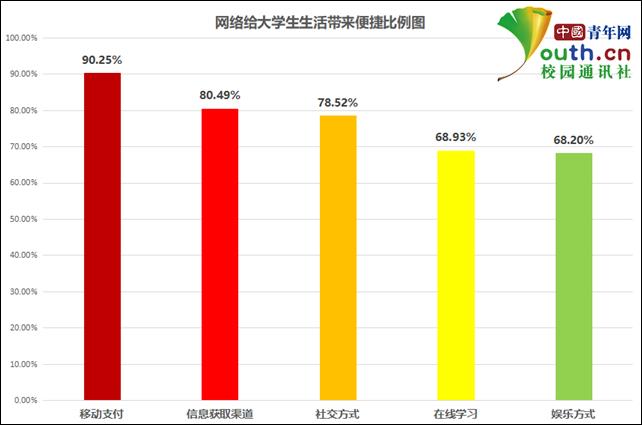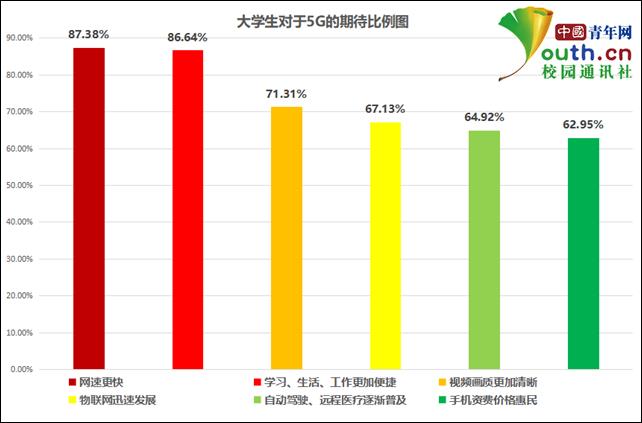Investigation on mobile phone surfing of college students: over 40% surf the Internet for more than 5 hours every day.
China Youth Network, Beijing, October 21st "It’s not that I’m not sleepy. I just want to wait. As for what? I don’t know, I just want to wait. "This passage has become the mantra of many college students. And this "wait", most of them are brushing their mobile phones. So, how long do college students surf the Internet on their mobile phones every day? What are you mainly doing? Are you worried about network security?
Recently, China Youth Network Campus News Agency conducted a questionnaire survey among 1,220 college students around the country. The results show that more than 40% of students surf the Internet for more than 5 hours every day, and more than 80% of students surf the Internet mainly for social chat. Most students think that surfing the Internet by mobile phone makes mobile payment, information acquisition and social communication more convenient. Nearly 90% of students are worried about network security, and most students expect the network speed of 5G to be faster and more convenient for study and life.

The picture shows the proportion of college students’ mobile phone surfing time every day. China Youth Network reporter Li Huaxi cartography
Over 40% of students surf the Internet on their mobile phones for more than 5 hours every day, and over 80% of students mainly chat socially.
Wu Lin, a student of Sichuan Agricultural University, uses his mobile phone to surf the Internet every day for about 6 hours. "It has become my habit to brush my mobile phone when I wake up every day. Now surfing the Internet is a daily need. I feel that I don’t have much to do except surfing the Internet. I like chatting, watching news and playing games online when I have no classes. I can’t stop playing my mobile phone."
Like Wu Lin, there are not a few college students who have the habit of surfing the Internet for a long time. According to a survey conducted by a reporter from China Youth Network, 41.56% of college students spend more than five hours on their mobile phones every day. When surfing the Internet, 83.93% of the students mainly chat socially, followed by consulting materials and listening to songs, accounting for 62.46% and 58.61% respectively.
"I am deeply dependent on the Internet, partly because of my shortcomings in social skills." Joline, a student of Northwest Normal University, told reporters that she is introverted and unwilling to communicate face to face. She can express herself more directly and accurately online. She will keep a diary on the trumpet in Weibo, and what she is embarrassed to say in person can be expressed by WeChat. "Besides, I can also tell my story with strangers through Zhihu."

The picture shows the proportion of college students’ mobile phone surfing behavior. China Youth Network reporter Li Huaxi cartography
Mobile Internet access makes mobile payment, information acquisition and social communication more convenient.
So what convenience does mobile Internet access bring to college students’ daily life? In the survey, China Youth Network reporter found that most of the students interviewed thought that surfing the Internet by mobile phone made mobile payment, information acquisition and social communication more convenient, accounting for 90.25%, 80.49% and 78.52% respectively.
"Now you don’t have to bring cash when you go shopping. It’s really convenient to pay by QR code." Zhao Tingting, a student at Guilin University of Technology, said that it used to be troublesome to use cash for shopping. Now, with mobile payment, the mobile phone can scan the code to pay, which not only saves a lot of time, but also brings great convenience to life.
Chen Yixin, a student at Chengdu University of Information Science and Technology, told reporters that after going to college, she often chats with her parents online. "Sometimes I use WeChat videos, and it is very convenient to contact them anytime and anywhere even if I don’t go home." She also said that now she mainly watches news through Weibo and news apps, so she can keep abreast of the latest hot events, which is very fast.

The picture shows the proportion of convenience brought by mobile internet access to life. China Youth Network reporter Li Huaxi cartography
Nearly 90% are worried about network security, and most students expect 5G network speed to be faster and study and life more convenient.
Xie Wenyi is a student of Shandong University of Technology, and he attaches great importance to network security. "I have learned that bank card deposits may be stolen by clicking on the link to help bargain, which makes me very worried about network security." In order to avoid the disclosure of personal information, he will be more cautious when registering his account. He told reporters that many friends around him have fallen into the trap of online fraud, so they must strengthen their prevention.
The results of this survey show that 88.03% of the respondents are as worried about network security as Xie Wenyi. In addition to network security issues, 5G has also become a hot topic this year. When talking about the expectation of the 5G era, 87.38% of the respondents hope that 5G will make the network speed faster, and secondly, it will make the study and life more convenient and the video quality clearer, accounting for 86.64% and 71.31% respectively.
Hong Yumin studied in Hope College of Southwest Jiaotong University, and she needed to surf the Internet frequently for professional reasons. When talking about 5G, she said that 5G is a "good medicine" for architectural drawing. It doesn’t take a long time to download the software installation package, which greatly shortens the students’ drawing time. Compared with 4G, 5G is more stable and not easy to get stuck. When drawing, you don’t have to worry about network failure, which can guarantee the smooth birth of the work.

The picture shows the proportion of college students’ expectations for 5 G. China Youth Network reporter Li Huaxi cartography
Teachers in colleges and universities suggest that Internet surfing time should be arranged reasonably and network security protection should be done well.
Yang Mei, an administrative teacher at School of Information Engineering, Sichuan Agricultural University, believes that college students spend more time on the Internet than study time. Although this has become a common phenomenon, students are advised to pay attention to study. "At present, many students will become very anxious when they leave their mobile phones. In fact, students will make good use of the Internet to arrange their free time and pay more attention to WeChat official account and online classes related to their majors or employment, which will be helpful for future postgraduate entrance examinations or job hunting."
"Don’t easily click on pop-up web pages or unreliable advertising links shared by others, which are likely to contain viruses. When surfing the Internet in Internet cafes outside, don’t connect your USB flash drive, mobile phone and other things containing important personal information to your computer, which is easy to cause network security problems." At the same time, as the class teacher of the students, Yang Mei recommends students with poor self-control to use professional APP for entertainment time management, hoping that students can concentrate on their studies and focus on their studies.
This semester, Fan Yingjie, a teacher of Marxism College of Chengdu University, asked students to strengthen self-discipline, stay away from the internet at least half a day to one day in class and at ordinary times, and learn to control themselves. She hopes that through these ways, students can understand that instead of constantly paying attention to other people’s lives through mobile phones, it is better to live their own lives and do their own things in a down-to-earth manner.
Fan Yingjie also mentioned that regarding the issue of network security, the relevant state departments released a lot of warning case materials when promoting network security, hoping that students would learn more about it. "When using mobile phones or computers to surf the Internet, students should not randomly click unfamiliar links to avoid revealing personal information on the Internet, and try their best to do network security protection." (At the request of the interviewee, the names of the students in this article are all pseudonyms.)
(Reporter Li Huaxi correspondent Yang Qing)